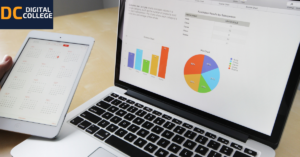What is Digital Marketing Funnel?
The Digital marketing funnel is a visualization for understanding the process of turning leads into customers, as understood from a marketing (and sales) perspective.
The idea is that, like a funnel, marketers cast a broad net to capture as many leads as possible, and then slowly nurture prospective customers through the purchasing decision, narrowing down these candidates in each stage of the funnel. Ideally, this marketing funnel would actually be a marketing cylinder, and all of your leads would turn into customers.
Stages of Marketing Funnel:
1. Awareness:
Awareness is the uppermost stage of the marketing funnel. Potential customers are drawn into this stage through marketing campaigns and consumer research and discovery.
Trust and thought leadership is established with events, advertising, trade shows, content (blog posts, infographics, etc.), webinars, direct mail, viral campaigns, social media, search, media mentions, and more.
2. Interest:
Once leads are generated, they move on to the interest stage, where they learn more about the company, its products, and any helpful information and research it provides. Marketers can nurture leads through emails, content that is more targeted around industries and brands, classes, newsletters, and more.
3. Consideration:
In the consideration stage, leads have been changed into marketing-qualified leads and are seen as prospective customers. Marketers can send prospects more information about products and offers through automated email campaigns while continuing to nurture them with targeted content, case studies, free trials, and more.
4. Intent:
To get to the intent stage, prospects must demonstrate that they are interested in buying a brand’s product. This is an opportunity for marketers to make a strong case for why their product is the best choice for a buyer.
5. Evaluation:
In the evaluation stage, buyers are making a final decision about whether or not to buy a brand’s product or services. Typically, marketing and sales work together closely to nurture the decision-making process and convince the buyer that their brand’s product is the best choice.
6. Purchase:
This is the last stage in the marketing funnel, where a prospect has made the decision to buy and turns into a customer. This is where sales take care of the purchase transaction.
Winding up with the topic of Marketing Funnel, here are some of the few thoughts regarding Marketing Funnel:
If you don’t have a marketing funnel yet, it’s time to start building one.
Begin with baby steps and focus on making a simple funnel, fixing issues, and identifying opportunities for growth.
After that, you can look at expanding beyond the traditional funnel with more stages, like Retention and Advocacy.
Remember: it’s not just about acquiring new customers but also you need to encourage them to be loyal and refer all their friends too. Digital marketing books can also be a great way to get more knowledge on the same.



